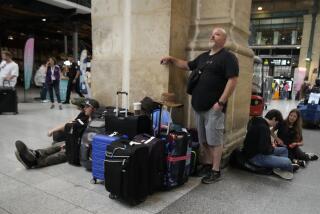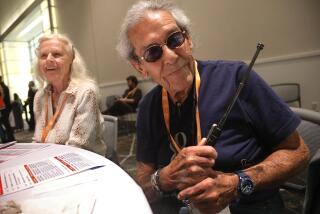Subway Riders Found Themselves in Inferno
- Share via
MOSCOW — It is one of the evil wonders of the powerful explosion that rocked a Moscow subway train Friday that it was heard by Marina Shandra, who had never heard anything in her life.
Speaking in sign language -- her slim fingers trembling as they raced -- the 19-year-old deaf student said the explosion two cars ahead of her plunged the train into a darkened, smoky panic as terrified passengers crawled over the dead and wounded to escape.
“The explosion was so strong that even I could hear it,” she said of the vibrations she felt in her ears. “I couldn’t breathe because of the smoke. I saw people running. Tears were running down my eyes, and my chest was aching very strongly, but the fire was still burning, so I had to run.”
By the time it was over, there were 39 dead and more than 130 injured on the bustling morning commuter train -- packed so full that the doors could barely close when a powerful bomb exploded just after 8:30 a.m.
The blast left parts of central Moscow in chaos and gridlock, as the city’s entire ambulance fleet battled its way through rush hour traffic to reach the scene of twisted metal and broken glass, deep underground.
Russian President Vladimir V. Putin blamed the attack on Chechen terrorists. He singled out Aslan Maskhadov, the leader of the separatists who have been fighting for independence in the southern Caucasus republic of Chechnya -- although Maskhadov quickly denied involvement and condemned the bombing.
“Russia does not talk with terrorists. It liquidates them,” Putin said.
In Washington, President Bush condemned the subway attack.
“No cause ever justifies the killing of innocent life,” the president said in a statement. “The United States stands with Russia in opposing terrorist acts and in our determination to bring the perpetrators to justice.”
Police distributed a composite sketch of a suspect, a 40-ish man of Caucasian appearance. Some witnesses said they saw two women accompanying him, according to Russian news agencies.
The man reportedly approached the person on duty at the subway station and said: “The party is about to start for you now.”
The incident is the latest of at least 10 bombings on Russian soil linked to Chechnya since the eve of Russia’s second war in the republic in 1999.
Moscow’s Metro system, elegantly decorated and efficiently connected to most of the central city, has had extra police on duty for most of the last year, eyeballing entrants and occasionally stopping passengers for identification checks. But in the busiest subway system in the world, serving 8.5 million passengers a day, authorities admit there is no guarantee that terrorists will not infiltrate.
“Terror is entering its most horrible phase -- explosions in the Metro, something the specialists have talked about and everyone has feared so much,” NTV correspondent Vladimir Kondratyev said in his Friday night report. “Terror is becoming a customary thing, and the authorities are powerless to counter it.”
Authorities said there was no conclusive indication of whether Friday’s attack was a suicide operation or a bomb left on the train in a case. They said it carried the explosive force of 11 pounds of TNT -- strong enough, witnesses said, to peel open the train’s metal frame like a can.
Vladimir Gregorian, a 46-year-old computer engineer, was riding in the car in which the explosion occurred.
“I got on the train, and there were so many people there that when the doors closed, I was standing right next to them,” he said. A woman was squeezed close behind him.
“It had hardly ridden for 30 seconds when I heard a very loud pop. Something fell on my head, and I lost consciousness,” Gregorian said. “When I came to, my hair and my hat were on fire. It was pitch dark. I could hear the screams of people, but I couldn’t see anything.
“Then the train stopped in front of the emergency lighting in the tunnel, and I could see that the woman behind me had been blown to bits. The door was bulging like a can that exploded from the inside.”
All over the mangled car were bodies, he said. “It looked like a nightmare. People were lying on top of each other in different, unnatural positions, both dead and alive. Those who could, crawled through the hole in the door and got out.”
But by then, the train was on fire and the tunnel quickly filled with smoke.
Passengers described choking as they made their way through the dark, while passengers trapped farther back in the tunnel were forced to wait for more than two hours to be evacuated.
“Everyone had their mobile phones, and we quickly knew there had been an explosion. The young people took it bravely, but I have phobias, and I don’t know how I got through it. The only thing you could think about was the smell -- something burning,” Svetlana Bragina said, crying as she stood in a nearby street afterward.
Even at the next Metro station, bystanders were thrown off their feet by the shock wave blasting out of the tunnel.
“It was a weird sensation. I couldn’t hear it with my ears, but my neck got stiff, I felt as though my head was being blown off my shoulders, and I got blown off the stairs,” said Irina Domash, who was on her way to work at a food market.
Alexandra Tarasova, who was riding two cars behind the blast, said sparks flew in all directions before it went dark.
“Thank God, there were some people in my car who must have been aware of the evacuation procedure. They were trying to calm the crowd down, to talk the people into not yielding to panic.... It was they who told us to start breathing through handkerchiefs and hats, and to try to squat to avoid the smoke.”
Rescue workers were greeted with a chilling spectacle.
“It looked really horrible. The car was twisted and totally damaged, and there were fragments of bodies scattered all over the place in the tunnel,” said Mikhail Plotitsen, spokesman for the Emergency Situations Ministry.
Gregorian rushed out of the subway tunnel and refused medical aid. He took a cab home. His wife, Katya, met him at the door in horror.
“He was bleeding from one eye and both ears,” she said. “The inside of his coat was melted, and the arm of his jacket was covered with blood and the bits of someone else’s flesh.”
Shandra, the deaf student, sent a text message to her aunt from the tunnel.
“I’m fine, but my chest hurts, and I’m trying to figure out how to get out,” she wrote.
Later, she sat crying in her living room, forming some of the words with her fingers, writing others when her fingers couldn’t find the right ones.
“I felt sorry for all those people,” she said. “There were little children there, and they were crying. I can’t imagine how human beings could do this to other human beings.”
Alexei V. Kuznetsov in The Times’ Moscow Bureau and Times staff writer Maura Reynolds in Washington contributed to this report.
More to Read
Sign up for Essential California
The most important California stories and recommendations in your inbox every morning.
You may occasionally receive promotional content from the Los Angeles Times.










